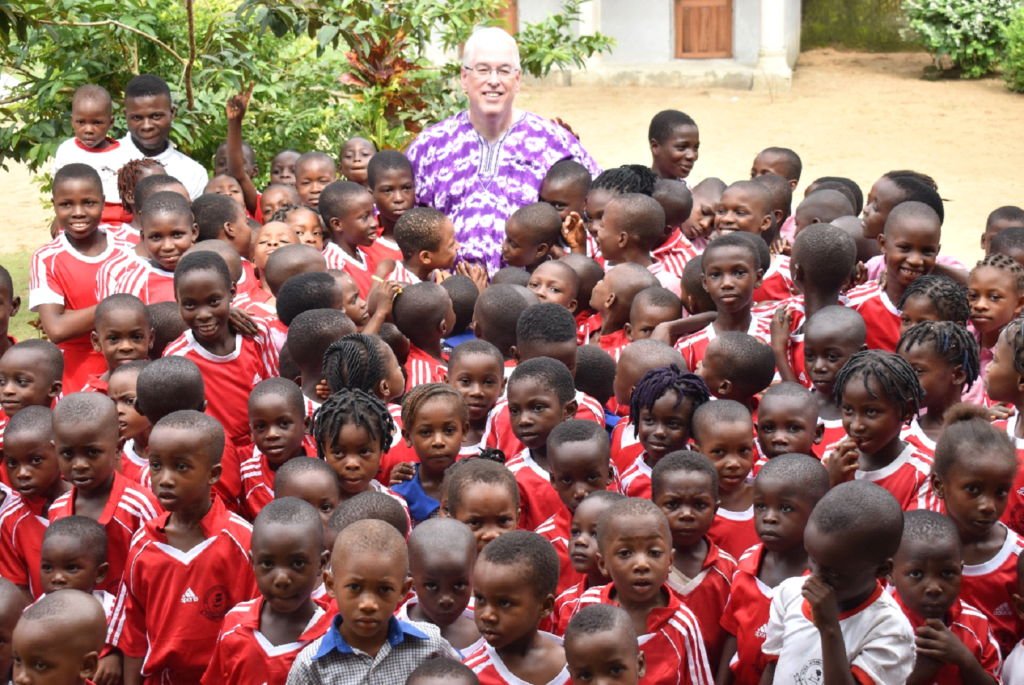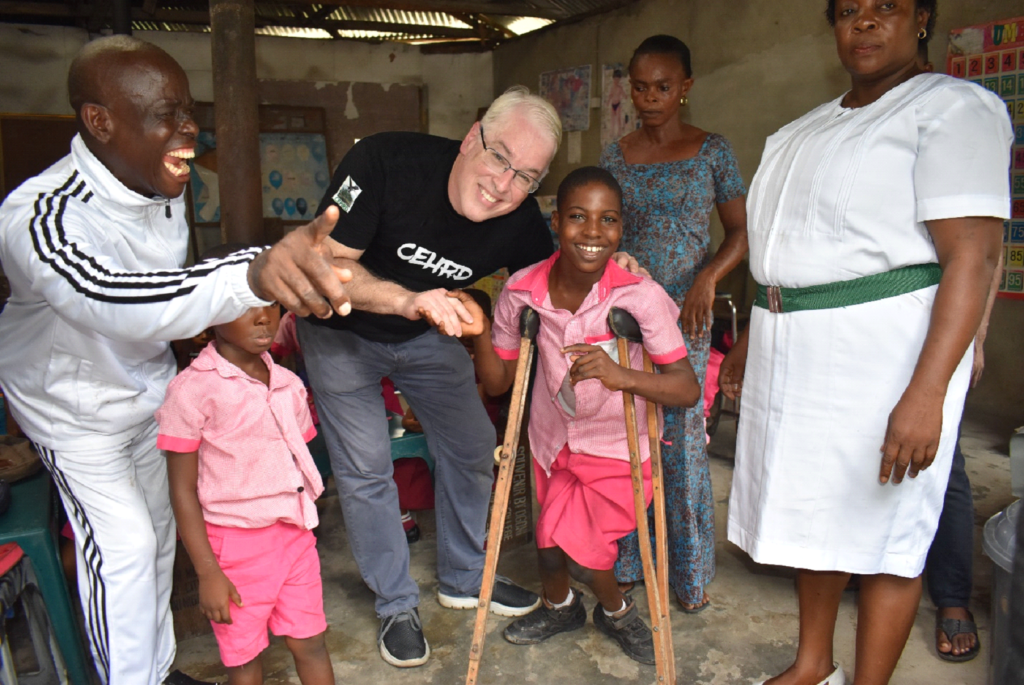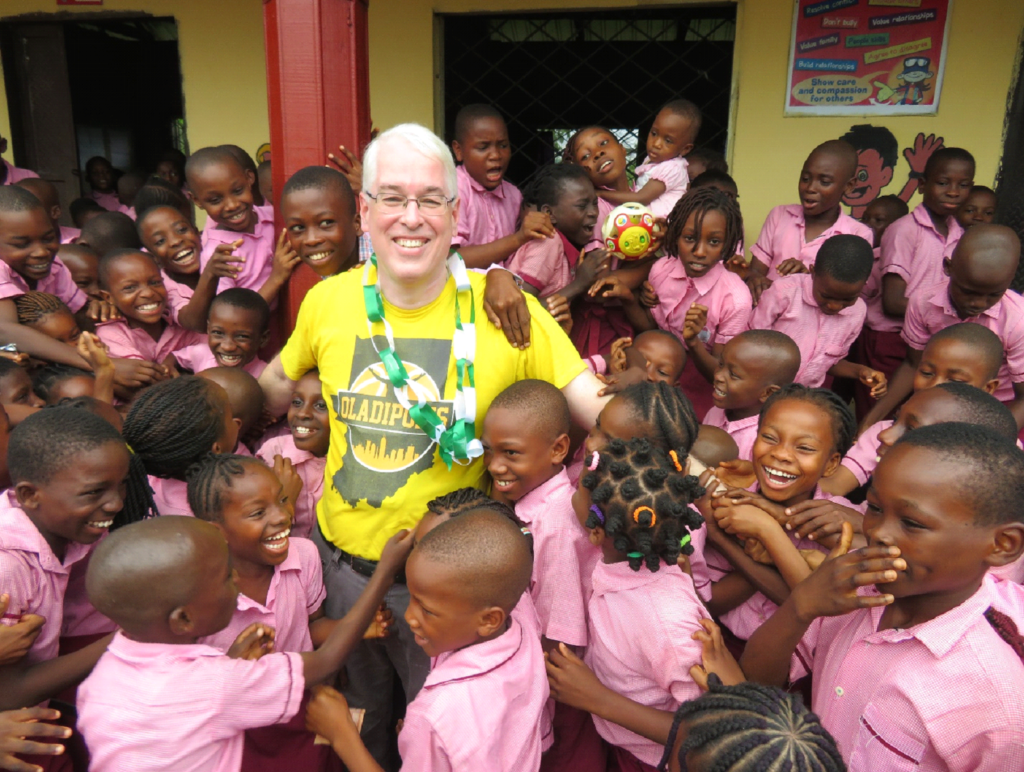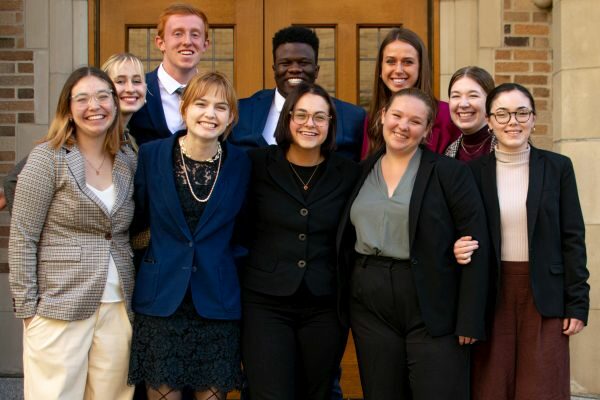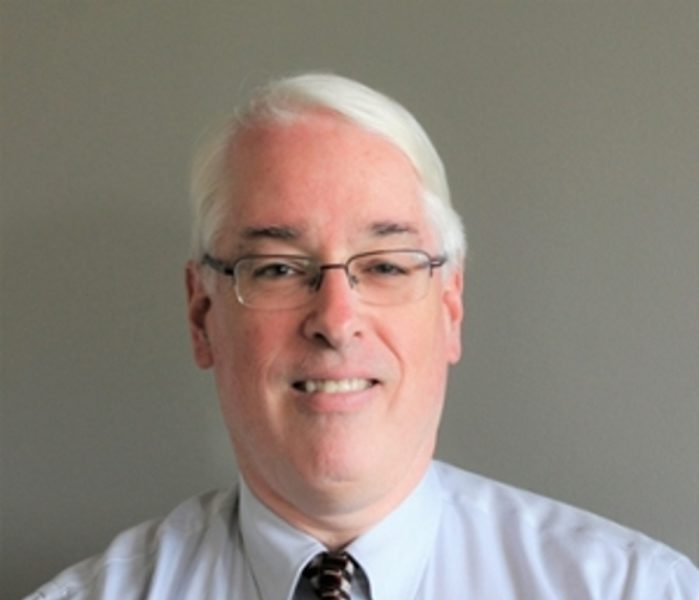
Congratulations to Dr. Scott Pegg for winning the E.F. Byrne Peace and Global Justice Award for Faculty!
The award is given for the best essay on what needs to be done to diminish conflictual situations in the world and enhance arrangements conducive to peace. Dr. Pegg will put 100% of the $2,250 award towards socially distanced nutrition programs in Nigeria.
Below you can find Dr. Pegg’s award winning essay and photos of his excellent work with the Bebor Model Nursery & Primary School located in Bane, Bodo, and Bori, in Rivers State, Nigeria.
What Can an IUPUI Professor of Liberal Arts Reasonably Be Expected to Do to Promote Peace and Global Justice?
An original unpublished essay submitted by Scott Pegg, Professor of Political Science, IUPUI, smpegg@iu.edu, for consideration for the 2020 E. F. Byrne Peace and Global Justice Award.
Introduction
The inspiration for my title and central research question comes from the Australian philosopher Peter Singer’s influential work The Life You Can Save: Acting Now to End World Poverty. In that work, Singer addresses the question of what people living in the west can reasonably be expected to do to alleviate global poverty. To do this, Singer first develops what he terms “a logical argument from plausible premises” (Singer 2009, p. 15). His logical argument is based on four premises: 1) “Suffering and death from lack of food, shelter, and medical care are bad”; 2) “If it is in your power to prevent something bad from happening, without sacrificing anything nearly as important, it is wrong not to do so”; 3) “By donating to aid agencies, you can prevent suffering and death from lack of food, shelter, and medical care, without sacrificing anything nearly as important”; and 4) “Therefore, if you do not donate to aid agencies, you are doing something wrong” (Singer 2009, pp. 15-16).
Initially, Singer’s “logical argument from plausible premises” seems plausible. The argument, though, gets extremely demanding when one carefully considers what is meant by “without sacrificing anything nearly as important” in the second and third premises. Singer (2009: 18) illustrates the difficulties here by giving the example of someone who donates $200 to save a child’s life and all it cost him or she was some clothes they didn’t really need to buy. Yet, Singer points out that celebrating this good deed by having a nice dinner out is problematic because that money could also be donated to help someone suffering from extreme poverty. Extending this argument further, we would have to give up Netflix, Starbuck’s, eating out, nicer cars, taking our families to Pacers games, vacation travel, etc. because none of those things are “nearly as important” as saving the lives of poor people dying from easily preventable diseases, suffering from grossly inadequate nutrition or in need of transformative, simple and affordable surgeries like cataract operations or fistula repairs.
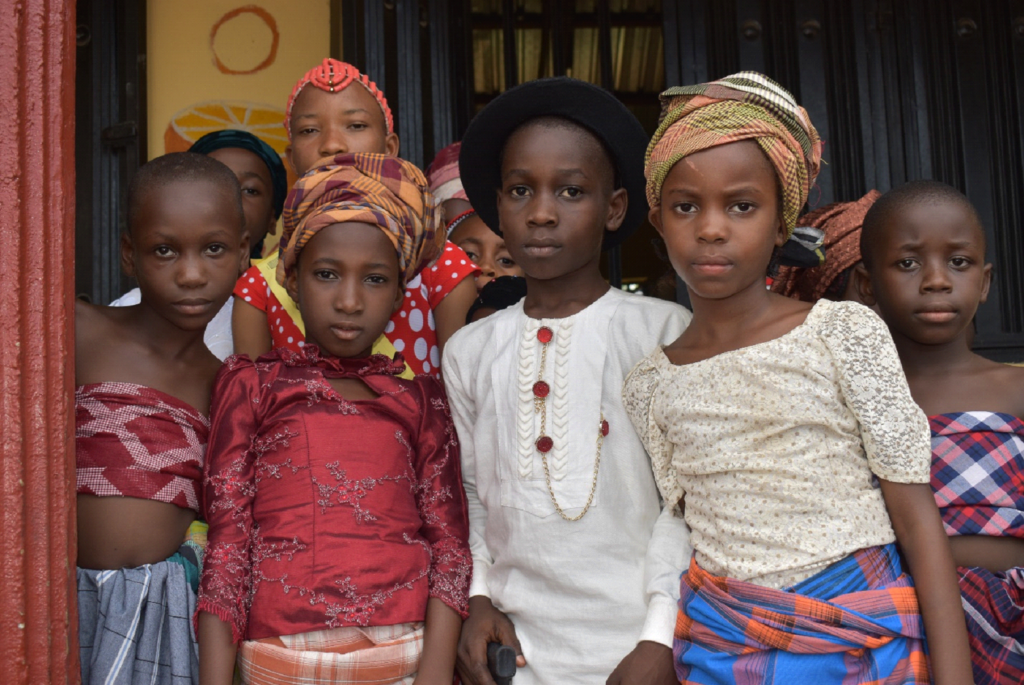
Children from school in Bane in traditional dress after performing at welcoming ceremony, November 2019.
At this point, Singer accepts that most westerners are not going to adopt austere lifestyles, sell their possessions and give them to the poor. In his words, “Faced with an ethical argument that requires us to give away much of our income, we might ask whether there is any point to a standard that cuts so strongly against the grain of human nature that virtually no one follows it” (Singer 2009: 151). Singer thus transits away from his “logical argument from plausible premises” and tries to figure out instead what is a reasonable expectation which most people could meet and which, collectively, would make a huge difference toward eradicating global poverty. Ultimately, Singer (2009: chapter ten) ends up advocating for “a realistic approach” which essentially is a proposal along the lines of a graduated income tax system where people earning less than $105,000 per year would voluntarily donate one percent of their income toward alleviating global poverty (donations to the local symphony or art museum would not count toward this total). People earning between $105,001 – $148,000 would voluntarily donate five percent of their income with subsequent levels of income donating five percent of the first $148,000 of their income, 10 percent of the next $235,000, etc. on up to people earning more than $10,700,000 donating 33.33 percent of their income above that level (Singer 2009: 164). Singer calculates that such a scheme in the United States alone would annually generate around $510 billion to fight global poverty which is more than double the amount of money economist Jeffrey Sachs estimated would be needed annually to meet all the United Nations’ Millennium Development Goals (Sachs 2006).
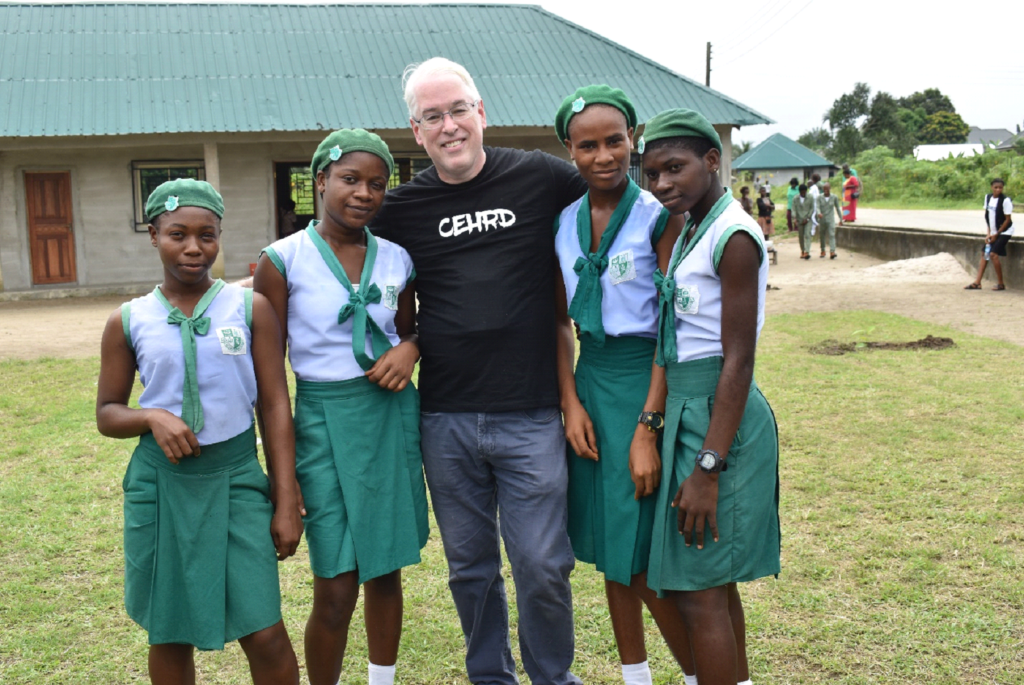
Dr. Pegg and girls who graduated from Bebor and are now enrolled in the Bodo City Girls’ Secondary School, November 2019.
One can quibble with Singer’s calculations or poke holes in his arguments. That is not my purpose here. Instead, I suggest that his distinction between “a logical argument from plausible premises” that is impossibly demanding and “a realistic approach” that most people might accept and adhere to provides an avenue to explore the central research question of this essay: “what can an IUPUI Professor of Liberal Arts reasonably be expected to do to promote peace and global justice?” As is clear from the way that question is written, I do not think we need to spend time on what a perfectly ethical IUPUI professor of Liberal Arts could potentially do to promote peace and global justice. Such individuals probably don’t exist or, if they did, they would probably fail to devote enough time and attention to their research, teaching and service to secure promotion and tenure in the IU School of Liberal Arts at IUPUI. Therefore, my concern is with those of us who are fully committed to our jobs as professors or lecturers and who feel privileged, as I do, to have the jobs we have but who want to devote some of their time and talents to making the world a more just and peaceful place. What can we reasonably expect from such professors?
To answer this question, I draw heavily from my own experiences and the lessons I have learned in trying to do just this. While my experiences are unique, there are broader principles or lessons that can be derived from them.
At IUPUI
My starting point is that any IUPUI professor concerned with promoting a more just and peaceful world must incorporate that desire into their academic work. Our tripartite framework of research, teaching and service responsibilities provides a useful way to think about this. First, in terms of research, we have considerable freedom in setting our own research agendas and we can orient them around questions of peace, justice, equity, conflict resolution, post-conflict peacebuilding or other such relevant topics. In my own case, I have chosen to focus my research agenda on two main areas: natural resource wealth management in sub-Saharan Africa and what I term de facto states which are essentially secessionist entities that control territory and provide governmental services over an extended time period but whose claims to sovereignty remain largely or entirely unrecognized by the international community. Contemporary examples of such entities include Abkhazia, Nagorno-Karabakh, Northern Cyprus, Somaliland and Transdniestria.
My research record of sustained and influential publications speaks for itself. I have contributed significantly to the development of the scholarly literature on corporate social responsibility (CSR) and the role that oil, gas and mining corporations may play in promoting, respecting or violating human rights in their local host communities. I have also contributed extensively to the case study literature on “resource cursed” sub-Saharan African states like Chad and Nigeria, as well as the relative success story of Botswana. Within the de facto state literature, I have focused most closely in recent years on Somaliland which is an incredibly peaceful, secure and democratic entity in one of the most volatile regions of the world (the Horn of Africa) and one whose generally successful post-conflict peacebuilding and state reconstruction has proceeded largely without foreign assistance or intervention.
Our second main area of focus, teaching, is another venue we must pursue in educating our students to be better and more informed global citizens. The most specific way that I have addressed larger questions of war and peace is through my POLS Y375 War and International Conflict class. In the context of the Byrne Peace and Global Justice Award Essay, I am pleased to note that the last several iterations of this class have featured a four class sub-segment of the course focused specifically on just war theory and the various ethical dilemmas the United States military confronts in its responses to the post-Cold War security environment.
My most frequent contribution to introducing IUPUI students to fundamental questions of war and peace is by frequently teaching POLS Y219 “Introduction to International Relations.” This class is most students first introduction to the international system of sovereign states. They learn about core concepts like anarchy, sovereignty and the balance of power as well as different International Relations theories like realism, liberalism, constructivism, Marxism and feminism.
One thing that I do every semester in my Introduction to International Relations class is introduce students to my work supporting nursery and primary schools in Rivers State, Nigeria which is described below. I do this in an attempt to break the prevalent belief that one must either join the Peace Corps and live in rural Malawi for three years or else give up and do nothing to address major challenges of global poverty or justice. I try to show through personal example that students can have careers and families in Indianapolis and still have a profound effect on a specific global problem of their choosing.
To the extent that it is possible, I have tried to integrate my concern for international peace and justice into my service work at IUPUI. I have served extended terms on the International Development Fund Advisory Committee (Spring 2004 – Fall 2017) and as a faculty advisor for the Office of International Affairs’ International Student Grant Program Scholarship Review Committee (Fall 2003 – Fall 2007, Spring 2009 – Spring 2011). Perhaps my most significant internationally-oriented service work at IUPUI has been serving as the founding director of the International Studies Program in the IU School of Liberal Arts (Fall 2004 – Summer 2011).
In short, if IUPUI professors are to promote a more just and peaceful world, one of the principal channels they must use to do so is by publishing first-rate academic research on questions relevant to those goals and teaching their students to understand and appreciate the importance of these issues. I believe I have done this.
Beyond IUPUI
Yet, I would argue that while your professional responsibilities at IUPUI must be part of any attempt to promote peace and global justice, such efforts must also go far beyond the university’s bounds. We can and should do research on important questions of peace and global justice and we should bring those issues into our classroom teaching in the hopes of inspiring students to get more involved on such issues in the future. But this is not enough. It is not nearly enough. In my view, IUPUI professors truly interested in promoting peace, global justice, gender and health equity and combatting the various ills generated by extreme poverty in the developing world must assume dedicated leadership of a specific initiative.
In my case, the personal imperative to do this came directly out of my research interests in African politics and the mismanagement of natural resource revenues by oil-rich sub-Saharan African states. The failure of the sub-Saharan African state to provide services to its rural population is widely noted in the academic literature. Nicolas van de Walle (2001: 96) observes that “The state’s core services in the countryside have been reduced to virtually none” while Ricardo Soares de Oliveira (2007: 103) maintains that for oil states in the Gulf of Guinea region, “The rural setting and its inhabitants in particular have been utterly forgotten, ejected, as it were, from the realm of state obligations.”
In the case of Nigeria, this abandonment of the rural areas is particularly striking given that Nigeria earned US$54 billion in oil revenues in 2018. Yet, in terms of primary education, Human Rights Watch (2007: 50) notes that “many local governments allocate next to nothing in their budgets to support primary education, and much of the money they do allocate disappears…. local education officials and civil servants said their chairmen had not renovated or repaired a single school building during their entire tenures.”
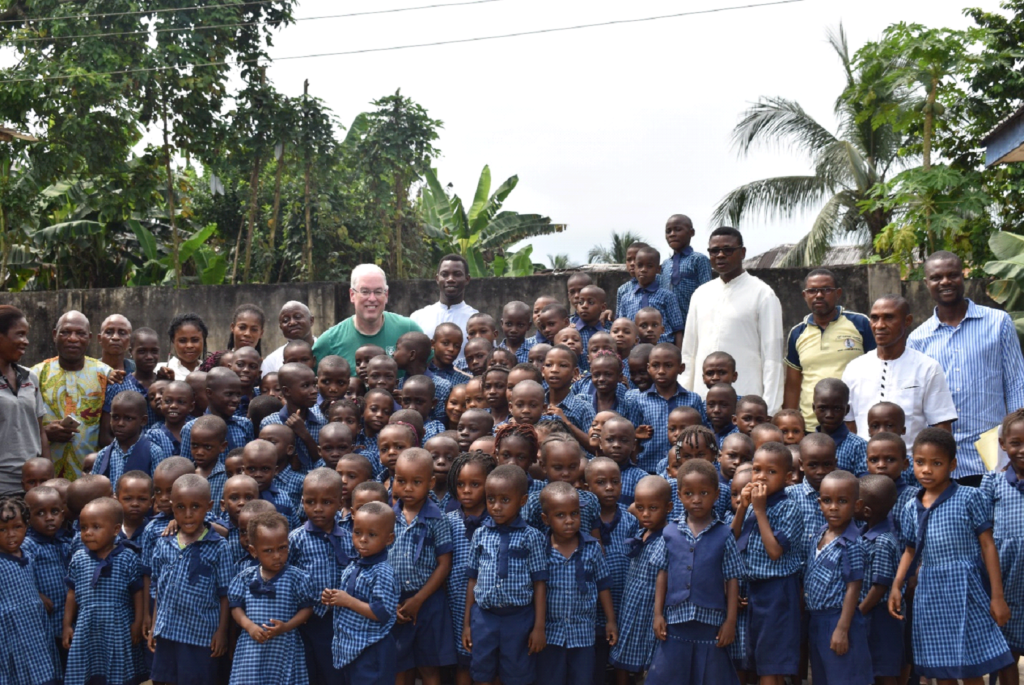
Dr. Pegg and priests, teachers, and students from St. Bernard’s Nursery and Primary School in Biara, November 2019.
Refusing to invest in education in an unstable region like the Niger Delta is particularly devastating given education’s impact on the propensity for civil war. As Thyne (2006: 751) has noted, “While other significant predictors of civil war, such as mountainous terrain and per capita income, are impossible or very difficult to change, education is an area that can be changed relatively easily…. For example, based on the findings that increased primary enrollment reduces the probability of civil war, an increase in aid specifically for primary education should result in a decrease in civil war.”
Large-scale foreign aid programs and oil industry corporate social responsibility initiatives have often failed badly in trying to address the basic needs of local villagers in the corrupt and politically unstable environment of the Niger Delta. As explained by Christian Aid (2004: 23), the Niger Delta is “a veritable graveyard of projects, including water systems that do not work, health centers that have never opened and schools where no lesson has ever been taught.”
This project grew out of frustration at the failure of the Nigerian government, large-scale foreign aid donors and the transnational oil companies to address basic human development needs in the rural Niger Delta. It also grew out of frustration with fellow academics who typically spend much time studying problems in the Niger Delta yet do absolutely nothing whatsoever to address them. It is thus informed by Dr. Paul Farmer’s (2004: 26) view that “writing of the plight of the oppressed is not a particularly effective way of assisting them.”
Growth and Evolution of My Civic Engagement Work in the Rural Niger Delta
I first visited Nigeria in April 2000. While there, one of my hosts introduced me to Reverend Moses Nyimale Lezor, the school director of Bebor Model Nursery/Primary School in Bodo, Rivers State, Nigeria who asked if I could help them. Convinced that I had found trustworthy local partners who were effectively trying to address abject poverty in their own communities, I discussed this with my then fiancée and now wife of nearly 20 years, Tijen Demirel-Pegg, and we agreed before we got married in October 2000 to ask people not to give us wedding gifts but to instead donate to help this school. I initially thought I knew 20 people who would donate $100, that would make $2,000 and they could “do something” with that. It is now almost 20 years later, that initial fundraising goal has been exceeded by a factor of more than 125 times and we have expanded to additional villages and gone through multiple phases of growth and evolution. Since 2002, we have been partnered with and working through the Indianapolis-based non-profit organization Timmy Global Health.
Today, we support six nursery and primary schools in five rural villages in Rivers State, Nigeria. Our schools are in the oil-producing Niger Delta region of Nigeria. The area we operate in is populated by the Ogoni ethnic or tribal group. According to Shell Oil’s own figures, 634 million barrels of oil valued at US$5.2 billion were taken from Ogoniland from 1958 – 1993 when production was halted in the face of a highly successful non-violent protest campaign led by Ken Saro-Wiwa and the Movement for the Survival of the Ogoni People (MOSOP). In the mid-1990s, this area was under military occupation and its people suffered from sustained and systematic human rights abuses (Human Rights Watch 1995; Human Rights Watch 1999). Despite the billions of dollars of oil wealth extracted from their land, nearly all Ogoni people today still lack access to electricity and piped drinking water.
My work with these schools has expanded gradually and evolved from providing classroom buildings to addressing water and sanitation needs to providing basic health care services like immunizations and deworming treatment. We started a pilot nutrition program in January 2017. The four-stage framework outlined below is a helpful way of understanding our work over the past two decades in the rural Niger Delta.
Phase One: Classroom building construction. The first phase of our work was to get the children we serve out of overcrowded and inadequate facilities and into proper classroom buildings. We started or completed work on seven classroom buildings, all of which have now been roofed with rust-proof aluminum zinc roofs which should never need to be replaced. All our schools are run by Nigerian school directors, have lessons taught by Nigerian teachers and follow curriculum standards set by the Nigerian government.
Phase Two: Water and Sanitation. As our classroom buildings were finished, we soon found ourselves in the situation of having hundreds of children in school buildings that did not have toilets or safe sources of drinking water. The second phase of our work saw construction completed on three sets of boys, girls and teachers’ toilets (one each in Bane, Bodo and Bori) and on three boreholes for safer drinking water (one each in Bane, Bodo and Bori). Two of the Catholic schools we have partnered with already had such facilities in place before we started helping them.
Phase Three: Health. We started a pilot health program for 100 of the poorest students at our school in Bodo in 2012. This program was designed by Dr. Nabie Nubari Francis, a Bodo native. Our health program is 100% implemented and run by Nigerians – Nigerian doctors, Nigerian nurses and Nigerian parents and volunteers. Other than financial support, it does not depend on foreign involvement in any way. After starting with just 100 students in 2012, our health program now provides basic immunizations (measles, polio, tetanus, typhoid and yellow fever plus Vitamin A supplements) and deworming treatment to more than 1,400 children at six different schools. We have also provided and equipped sickbays at four of the six schools we serve, with a fifth one under construction now.
Phase Four: Nutrition. In January 2017, we started a pilot nutrition program for 50 students at our school in Bodo. In Nigeria, malnutrition is the principal cause of 54% of the under-five deaths in the country. Our pilot nutrition program is based on three widely available local foods: millet, crawfish and soybeans. In combination, these three foods provide an incredible array of nutritional benefits. As funding allows, we hope to expand this program to more children in Bodo and then to children at our other schools as we have already done with our health program.
Civic Engagement Work by the Numbers
In 2018 and 2019, I personally conducted headcounts of every student in attendance at each of the six schools we serve on the days that I visited them. These figures certainly underestimate the total number of students served as anyone absent on those days for any reason would not have been counted. Based on those figures, we currently serve 1,459 students, of whom 723 (49.55%) are boys and 736 (50.45%) are girls. Greater than 50% girls’ enrollment is something I am particularly proud of because, in the words of Harvard economist Dr. Larry Summers, “There is probably no higher return on investment in the developing world than primary and secondary education for girls.”
Over the past 19 years, I have been almost solely responsible for raising and delivering $235,735 worth of financial support to these schools in 41 separate funding rounds (1st round of funding provided in January 2001; most recent round in February 2020). From 2010 – 2019, we have averaged providing approximately $14,723 of annual support to these schools. More than 75% of all funds raised to support these schools have come from individual donors. Our other principal sources of funding are schools, foundations, churches and corporate matching gifts.
Sharing expertise and building capacity at a local human rights organization
My global civic engagement in the Niger Delta has also entailed working since 2004 with the Nigerian non-governmental organization the Center for the Environment, Human Rights and Development (CEHRD). In 2004, I was asked to serve as one of the two founding International Advisory Board members for CEHRD. During my now 16 years of service on CEHRD’s international advisory board, the organization has grown from a tiny upstart into what is now widely viewed as the most important environmental and human rights group active in the Niger Delta today. Amnesty International and CEHRD, for example, have released several joint reports in recent years including The True ‘Tragedy’: Delays and Failures in Tackling Oil Spills in the Niger Delta (2011). I continue to serve as one of four International Advisory Board members for CEHRD today. My contribution to CEHRD’s growth and development has been modest, but I am extremely proud to be directly involved with building their capacity to pursue a grassroots struggle for improved respect for environmental and human rights in the Niger Delta.
My work with CEHRD and in Bodo intersected in the aftermath of two massive oil spills that hit Bodo Creek in 2008-2009. In November 2014, I provided a 16-page witness statement including dozens of photographs on behalf of the 15,000+ Bodo plaintiffs who sued the Shell Petroleum Development Company of Nigeria in a British court over these oil spills. In January 2015, Shell settled this lawsuit, agreeing to pay the Bodo plaintiffs £55,000,000 (approximately $83,000,000 at the time) in what is believed to be the largest ever settlement awarded to African plaintiffs against a transnational corporation and the only one that paid compensation directly to thousands of individual plaintiffs and not just to the local chief.
Lessons emerging from my work in Nigeria
There are, I would suggest, several lessons that come out of my work in Nigeria that other IUPUI professors could apply to similar initiatives of their own. First, we must be risk-takers and take on big challenges or hard problems. Warren Buffett once said something to the effect that the difference between business and philanthropy was that in business you sought to make the quickest and easiest money possible. In contrast, he suggested, with philanthropy, you would not do any good unless you took on hard or difficult challenges that had already defeated others. I have chosen to work in one of the most unstable regions of one of the most corrupt countries in the world. The Niger Delta has defeated organizations with far greater resources than I have and yet we have been able to work there peacefully for almost two decades, gradually expand our service provision and make real and tangible improvements in the lives of the children we serve.
Second, we must recognize our limits and sharply restrict our focus. I cannot save the world. I can, however, immunize and deworm more than 1,400 students, provide them with toilets for improved sanitation and boreholes for safer drinking water and ensure that their lessons are being taught in real classrooms with roofs that don’t leak. The only way I can do this, however, is by limiting my focus tightly to this one initiative which constantly threatens to overwhelm the time I can devote to it.
Third, to promote peace and global justice, perseverance and persistence are required. In the words of President Calvin Coolidge, “Nothing in this world can take the place of persistence. Talent will not; nothing is more common than unsuccessful men with talent. Genius will not; unrewarded genius is almost a proverb. Education will not; the world is full of educated derelicts. Persistence and determination alone are omnipotent. The slogan ‘Press On!’ has solved and always will solve the problems of the human race.” This fall we will celebrate twenty years working in Rivers State, Nigeria. God willing, we will still be working there twenty years from now.
Fourth, we must be humble and recognize the limits to our knowledge. We must work with local partners who understand local conditions and local needs far better than we do. I often tell people that there are two main reasons I depend so heavily on local partners. The “good reason” is that my academic research and teaching on global poverty and development informs my appreciation of the importance of local control and ownership. As the World Bank (2004, chapter 7, p. 15) has put it, “When communities are not involved in establishing, supporting, or overseeing a school, the school is often seen as something alien. Villagers refer to ‘the government’s’ school, not ‘our’ school.” The “bad reason” is that even if I wanted to micro-manage these schools, I cannot. I am based in Indianapolis and have no year-round presence in Nigeria. Although I believe it is important and the right thing to do, I must trust local people to make good local decisions because there is simply no other alternative. As one example, I was one of four people at the first meeting discussing our planned health program. We debated several different options and, at some point, Dr. Nabie suggested that we should provide deworming treatment. Other than having some vague understanding that worms were endemic in that part of Nigeria and that we could help treat them, I knew absolutely nothing about deworming at the time. I trusted Dr. Nabie’s judgment and agreed to follow his lead on this. Only later, after returning from Nigeria, did I first Google “deworming children in Africa” and find out that this is one of the most cost-effective development interventions you can make. According to the Abdul Latif Jameel Poverty Action Lab in the Department of Economics at MIT, “Funding mass, school-based deworming programs in areas of high worm load is among the most cost effective things any government, agency, or donor can do with their money. It is simultaneously one of the most cost-effective ways to improve child health and the most cost-effective ways to increase school attendance.” I only learned that because I first trusted our local partners.
Finally, and perhaps most important of all, is sincerity of purpose. You must lead from the front and lead by example. In my case, I have never received any salary for any of the work I do for Bebor or for CEHRD. I have also never used any donor funds to pay for any of my expenses (plane tickets, hotel rooms, visas, website hosting, etc.) related to the school project. My wife and I have donated more than $13,000 of our own funds to support this work and have always been among the ten most generous donors to this project since its inception in 2000.
Conclusion
I have been privileged enough to receive three significant awards recognizing the work I do in Nigeria – an honorary chieftaincy title in the village of Bodo (2002), having a small dirt path in that village designated “Chief Prof. Scott Pegg Road” (2005) and the IUPUI Chancellor’s Faculty Award for Excellence in Civic Engagement (2017).
I want to win the inaugural E. F. Byrne Peace and Global Justice Award for three main reasons. First, it is a prestigious honor. I feel that my personal answer to the question “what can an IUPUI professor of liberal arts reasonably be expected to do to promote peace and global justice?” makes me a worthy recipient of this award and a worthy role model for future candidates to emulate. Second, I want to win this award because I can use the prestige of this award to help me raise additional funds to support our ongoing work in Rivers State, Nigeria. Finally, and most importantly, I want to receive this award because I will donate 100% of the proceeds from this award to support our schools in Rivers State, Nigeria. This award would more than cover the cost of constructing and supplying the sickbay, which is currently under construction at our newest partner, St. Bernard’s Catholic Nursery and Primary School in Biara, Rivers State. It would almost cover six months of tuition fee scholarship funding for dozens of the poorest and most marginalized children at these schools and it would just about cover six months of our health program’s deworming and immunization costs. At a level of $2,250, this award would cover just over 15% of our annual funding needs. I don’t want this award for me. I want it because I need the funds to put toward supporting the 1,400+ beautiful children we serve every year in the rural Niger Delta.
Thank you for your consideration.
Bibliography:
Christian Aid. 2004. Behind the Mask: The Real Face of Corporate Social Responsibility. London: Christian Aid.
Farmer, Paul. 2004. Pathologies of Power: Health, Human Rights and the New War on the Poor. Berkeley: University of California Press.
Human Rights Watch. 1995. Nigeria: The Ogoni Crisis: A Case-Study of Military Repression in Southeastern Nigeria. New York: Human Rights Watch.
Human Rights Watch. 1999. The Price of Oil: Corporate Responsibility and Human Rights Violations in Nigeria’s Oil Producing Communities. New York: Human Rights Watch.
Human Rights Watch. 2007. Chop Fine: The Human Rights Impact of Local Government Corruption in Rivers State, Nigeria. New York: Human Rights Watch.
Sachs, Jeffrey D. (2006) The End of Poverty: Economic Possibilities for Our Time (New York: Penguin).
Singer, Peter. (2009) The Life You Can Save: Acting Now to End World Poverty (New York: Random House).
Soares de Oliveira, Ricardo. 2007. Oil and Politics in the Gulf of Guinea. New York: Columbia University Press.
Thyne, Clayton L. 2006. “ABCs, 123’s, and the Golden Rule: The Pacifying Effect of Education on Civil War, 1980-1999,” International Studies Quarterly, Vol. 50, No. 4, December 2006, pp. 733-754.
van de Walle, Nicolas. 2001. African Economies and the Politics of Permanent Crisis, 1979 – 1999. Cambridge: Cambridge University Press.
Vicente, Pedro C. 2010. “Does Oil Corrupt? Evidence from a Natural Experiment in West Africa,” Journal of Development Economics, Vol. 92, No. 1, May 2010, pp. 28-38.
World Bank. 2004. World Development Report 2004: Making Services Work for Poor People. Washington, DC: The World Bank.


